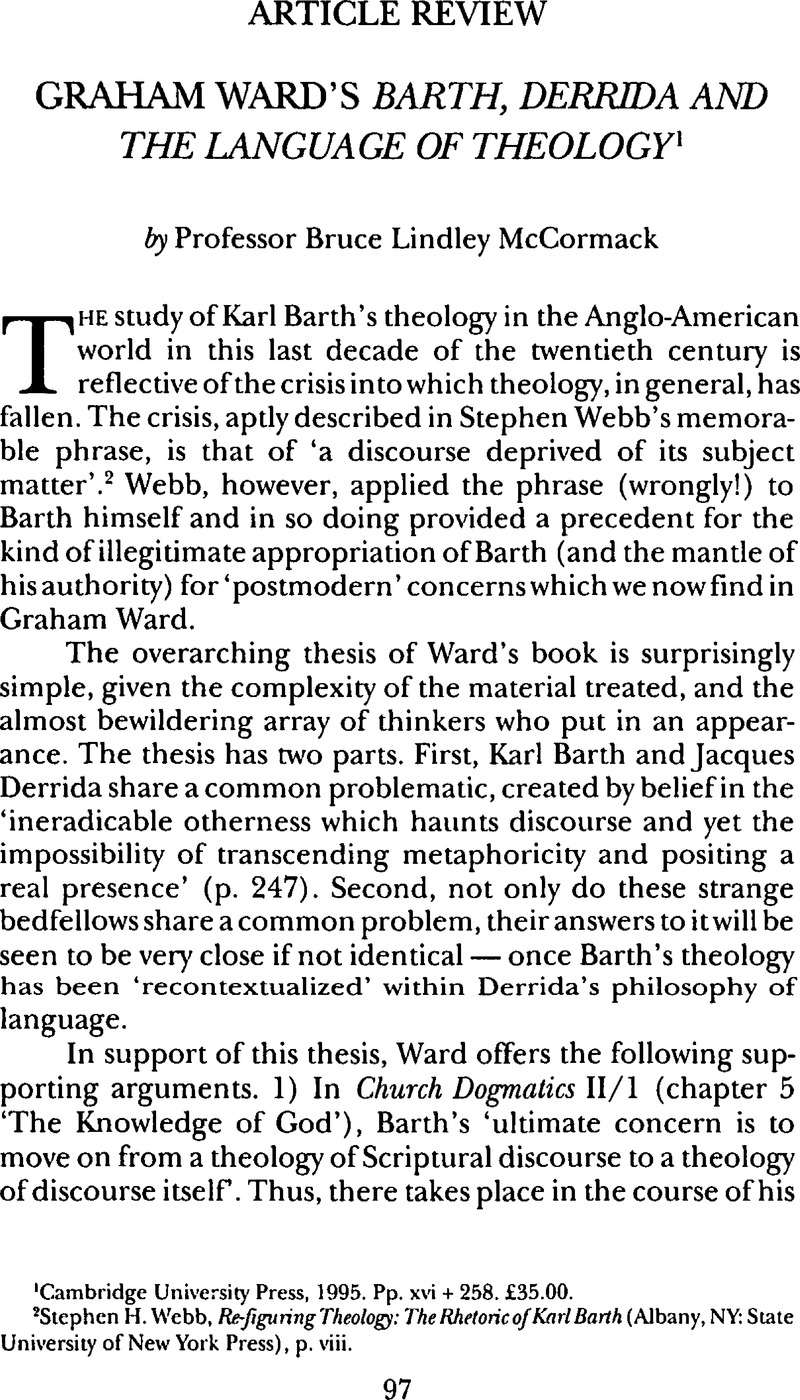Article contents
Graham Ward's Barth, Derrida and The Language of Theology1
Published online by Cambridge University Press: 30 January 2009
Abstract

- Type
- Article Review
- Information
- Copyright
- Copyright © Scottish Journal of Theology Ltd 1996
References
2 Webb, Stephen H., Refiguring Theology: The Rhetoric of Karl Barth (Albany, NY: State University of New York Press), p. viiiGoogle Scholar.
3 Barth, Karl to Thurneysen, Eduard, 11 November 1919 in Karl Barth — Eduard Thumeysen Briefwerhsel; Bank 1, 1913–1921, edited by Thurneysen, Eduard (Zūrich: TVZ, 1973), p. 351Google Scholar. [Hereafter cited as B-Th. Br.I.]
4 Karl Barth to Eduard Thurneysen, 22 March 1920 in B-Th Br.I, p. 376.
5 See Becker, Dieter, Karl Barth und Martin Buber—Denkerin dialogischer Nachbarshaft? Zur Bedeutung Martin Bubers für die Anthropologie Karl Barths (Göttingen: Vandenhoeck & Ruprecht, 1986), pp. 65–66Google Scholar. Thurneysen met Buber in December 1923 and found him to be ‘a good, sincere child of this world’. Thurneysen, Eduard to Barth, Karl, 7 December 1923, in Karl Barth — Eduard Thurneysen Briefwechsel; Bank 2, 1921–1930, edited by Thurneysen, Eduard (Zürich: TVZ, 1974), p. 204Google Scholar. It is perhaps significant, however, that although Thurneysen mentions Buber's name on five different occasions in his letters to Barth during the course of the twenties, Barth never once spoke of him. Barth did make frequent use of ‘I-Thou’ formulations in the context of elaborating his doctrine of revelation in thescxalled ‘Gōttingen Dogmatics’ (1924), thus showing that he was at least aware of the central formula of the dialogicians. But that much he could have learned indirectly. What is most significant is that his use the formula stood in an antithetical relation to their's. Whereas the use of ‘I-Thou’ language by the dialogicians constituted a declaration of war on the hegemony of ‘idealistic subject-object thinking’ (Becker, p. 65), Barth's employment of it was not so intended. And so Barth could say, ‘That truly God truly reveals Himself to human beings, that presupposes: 1. that God encounters man, 2. that man stands before God. But for our problem that means: that God becomes the object of knowledge and man becomes the subject of knowledge. …Whoever would contest the fact that God enters into this… subject-object relationship, becoming knowable in it, must deny revelation.’ That is to say, the address of God by means of which He makes Himself known does not take place outwith the subject-object relations in which the human knower stands (according to idealistic thinking) with respect to all the objects of her knowledge, but precisely in and through one such concrete relation. See Barth, , ‘Unlerricht in der christlichen Religion’; Zweiter Band: Die Lehre von Cott / Die Lehre Menschen, 1924/25, edited by Stoevesandt, Hinrich (Zürich: TVZ, 1990), p. 17Google Scholar. It is important to remember that Barth was a Swiss and as such, largely immune to the shattering effect which the loss of the war had on German thinkers like Buber. Thus, he did not share in the complete rejection of idealism which occurred in Germany at that time. Barth's relation to idealism was far more nuanced. He was seeking to overcome idealism from within.
6 Buber's famous book I and Thou first appeared in print in 1923. There is considerable scholarly debate as to when Buber was himself ‘converted’ to the cause of dialogicalism. Becker believes that it occurred only under the influence of Rosenzweig. If true, that would probably place Buber's move to dialogical thinking sometime in early 1922. See Becker, , Karl Barth und Martin Buber, p. 61–63Google Scholar.
7 For a fully elaborated argument in support of this assertion, see my recent book, Karl Barth's Critically Realistic Dialectical Theology; It Genesis and Development, 1909–1936 (Oxford: Clarendon Press, 1995), chapters 5 and 6Google Scholar.
8 See ibid., p. 309.
9 See Barth, Karl, ‘Unterricht in der christlichen Religion’; Enter Band: Prolegomena, 1924, edited by Reiffen, Hannelotte (Zürich: TVZ, 1985), pp. 107–115Google Scholar.
10 See ibid., p. 114: ‘The hiddenness of God, however, His incomprehensibililas, is His hiddenness not next to or behind but precisely in His revelation.’
11 Already in the Gōttingen Dogmatics, Barth could say, ‘No relativism, no scepticism, no personal shyness may hinder us from speaking of God with all the naivete, with all of the certainty, with all of the obviousness, with which one speaks precisely of a given. God is given in the revelation-relation through the Spirit. Well unto us, if we for that reason speak so certainly of Him, in the Spirit! And woe unto us, if we do not do so!’ See Barth, , ‘Unterricht in der christlkhen Religion’; Zweiter Band, p. 18Google Scholar.
12 Barth, Karl, ‘Das Wort Gottesals Aufgabe der Theologie’, in idem., Das Wort Gottes und die Theologie (Munich: Chr. Kaiser Verlag, 1925), p. 158Google Scholar.
13 On this point, see Dalferth, Ingolf Ulrich, ‘Karl Barlh's Eschatological Realism’ in Skyes, S.W.. edited Karl Barth: Centenary Essays (Cambridge: Cambridge University Press, 1989), p. 27Google Scholar.
- 2
- Cited by




